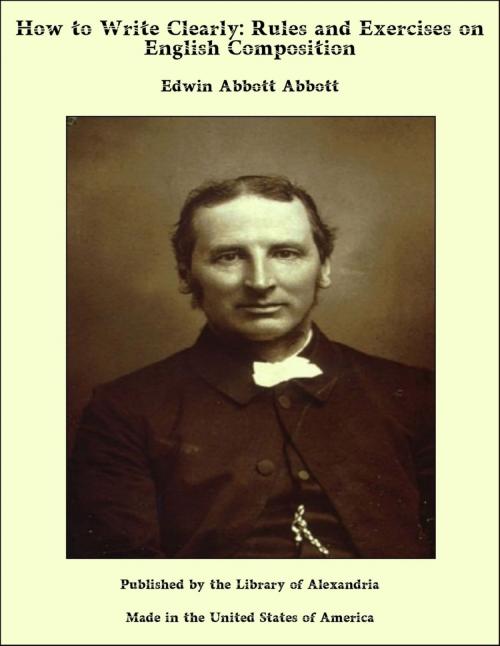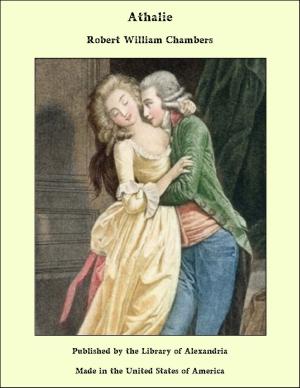How to Write Clearly: Rules and Exercises on English Composition
Nonfiction, Religion & Spirituality, New Age, History, Fiction & Literature| Author: | Edwin Abbott Abbott | ISBN: | 9781465614339 |
| Publisher: | Library of Alexandria | Publication: | March 8, 2015 |
| Imprint: | Language: | English |
| Author: | Edwin Abbott Abbott |
| ISBN: | 9781465614339 |
| Publisher: | Library of Alexandria |
| Publication: | March 8, 2015 |
| Imprint: | |
| Language: | English |
Almost every English boy can be taught to write clearly, so far at least as clearness depends upon the arrangement of words. Force, elegance, and variety of style are more difficult to teach, and far more difficult to learn; but clear writing can be reduced to rules. To teach the art of writing clearly is the main object of these Rules and Exercises. Ambiguity may arise, not only from bad arrangement, but also from other causes—from the misuse of single words, and from confused thought. These causes are not removable by definite rules, and therefore, though not neglected, are not prominently considered in this book. My object rather is to point out some few continually recurring causes of ambiguity, and to suggest definite remedies in each case. Speeches in Parliament, newspaper narratives and articles, and, above all, resolutions at public meetings, furnish abundant instances of obscurity arising from the monotonous neglect of some dozen simple rules. The art of writing forcibly is, of course, a valuable acquisition—almost as valuable as the art of writing clearly. But forcible expression is not, like clear expression, a mere question of mechanism and of the manipulation of words; it is a much higher power, and implies much more. Writing clearly does not imply thinking clearly. A man may think and reason as obscurely as Dogberry himself, but he may (though it is not probable that he will) be able to write clearly for all that. Writing clearly—so far as arrangement of words is concerned—is a mere matter of adverbs, conjunctions, prepositions, and auxiliary verbs, placed and repeated according to definite rules. Even obscure or illogical thought can be clearly expressed; indeed, the transparent medium of clear writing is not least beneficial when it reveals the illogical nature of the meaning beneath it. On the other hand, if a man is to write forcibly, he must (to use a well-known illustration) describe Jerusalem as "sown with salt," not as "captured," and the Jews not as being "subdued" but as "almost exterminated" by Titus. But what does this imply? It implies knowledge, and very often a great deal of knowledge, and it implies also a vivid imagination. The writer must have eyes to see the vivid side of everything, as well as words to describe what he sees. Hence forcible writing, and of course tasteful writing also, is far less a matter of rules than is clear writing; and hence, though forcible writing is exemplified in the exercises, clear writing occupies most of the space devoted to the rules.
Almost every English boy can be taught to write clearly, so far at least as clearness depends upon the arrangement of words. Force, elegance, and variety of style are more difficult to teach, and far more difficult to learn; but clear writing can be reduced to rules. To teach the art of writing clearly is the main object of these Rules and Exercises. Ambiguity may arise, not only from bad arrangement, but also from other causes—from the misuse of single words, and from confused thought. These causes are not removable by definite rules, and therefore, though not neglected, are not prominently considered in this book. My object rather is to point out some few continually recurring causes of ambiguity, and to suggest definite remedies in each case. Speeches in Parliament, newspaper narratives and articles, and, above all, resolutions at public meetings, furnish abundant instances of obscurity arising from the monotonous neglect of some dozen simple rules. The art of writing forcibly is, of course, a valuable acquisition—almost as valuable as the art of writing clearly. But forcible expression is not, like clear expression, a mere question of mechanism and of the manipulation of words; it is a much higher power, and implies much more. Writing clearly does not imply thinking clearly. A man may think and reason as obscurely as Dogberry himself, but he may (though it is not probable that he will) be able to write clearly for all that. Writing clearly—so far as arrangement of words is concerned—is a mere matter of adverbs, conjunctions, prepositions, and auxiliary verbs, placed and repeated according to definite rules. Even obscure or illogical thought can be clearly expressed; indeed, the transparent medium of clear writing is not least beneficial when it reveals the illogical nature of the meaning beneath it. On the other hand, if a man is to write forcibly, he must (to use a well-known illustration) describe Jerusalem as "sown with salt," not as "captured," and the Jews not as being "subdued" but as "almost exterminated" by Titus. But what does this imply? It implies knowledge, and very often a great deal of knowledge, and it implies also a vivid imagination. The writer must have eyes to see the vivid side of everything, as well as words to describe what he sees. Hence forcible writing, and of course tasteful writing also, is far less a matter of rules than is clear writing; and hence, though forcible writing is exemplified in the exercises, clear writing occupies most of the space devoted to the rules.















